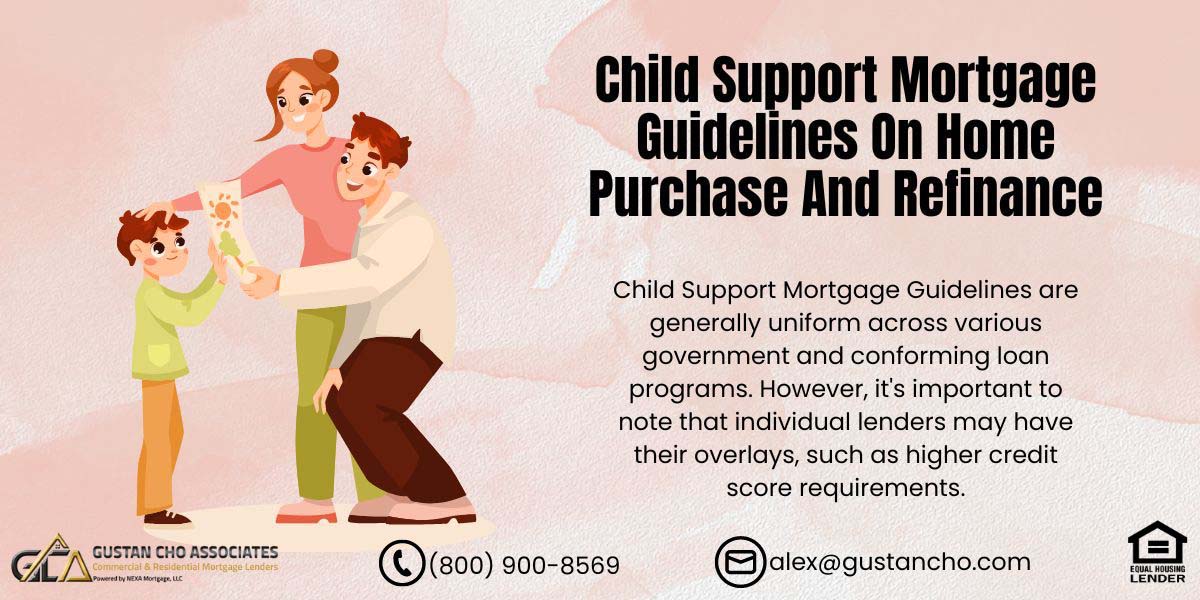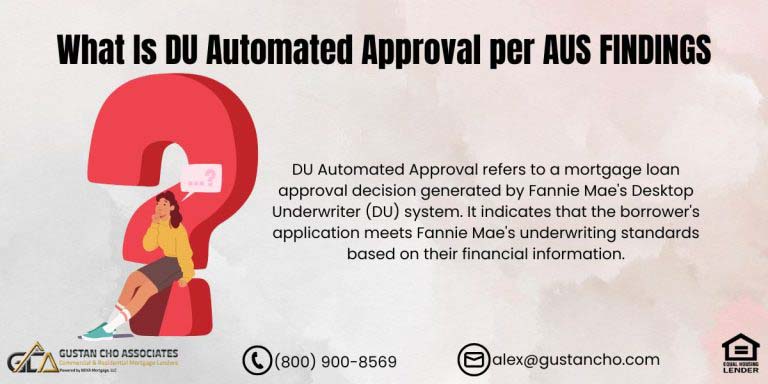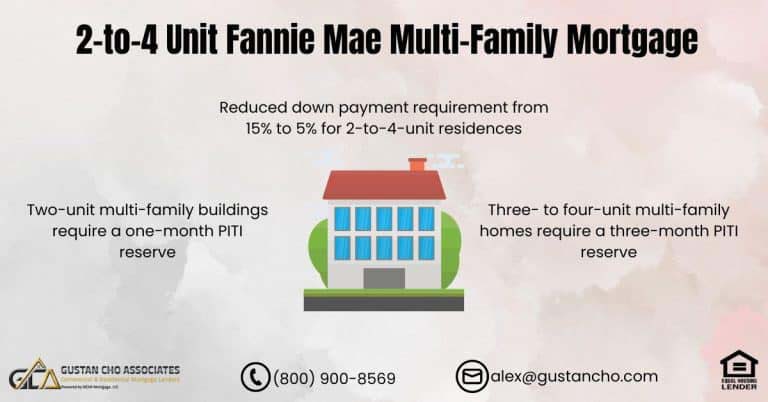This Article Is About The Child Support Mortgage Guidelines On Home Purchase And Refinance
Homebuyers can qualify for home loans with outstanding collections and charged-off accounts without paying them. Government and Conventional Loans do not require borrowers to pay outstanding collections and charged-off accounts as long as they can get an automated underwriting system approval (AUS).
FHA Loans is the most lenient when it comes to getting an approve/eligible per AUS FINDINGS. We will narrow our topic to Child Support Mortgage Guidelines on FHA Loans on this blog. Child Support Mortgage Guidelines are similar on all government and conforming loan programs.
Child Support Mortgage Guidelines Are Agency Guidelines
Not all lenders have the same FHA, VA, USDA, Conventional Lending Guidelines. For example, FHA requires borrowers to meet a 580 credit score for a 3.5% down payment home purchase FHA Loan. All lenders need to meet the 580 credit score requirements of their borrowers.
However, lenders can require higher credit scores such as 620 to 640. This higher credit score requirement is called lender overlays. All lenders need to meet Child Support Mortgage Guidelines. As mentioned earlier, all loan programs have the same Child Support Mortgage Guidelines. Borrowers cannot qualify for a mortgage unless the child support payment has been out of collection and in good standing.
Paying or Receiving Child Support? Know How It Affects Your Loan
Whether you’re the payer or recipient, child support impacts your DTI. We’ll help you navigate the guidelines.Does Paying Child Maintenance Affect Getting a Mortgage?
Paying child maintenance can impact your chances of securing a mortgage, with several factors influencing the outcome. The amount of child maintenance, your overall financial standing, and the lending institution’s policies are all pivotal considerations. To ascertain your capacity to manage mortgage repayments, lenders evaluate your income comprehensively, factoring in child maintenance payments.
Additionally, these payments are considered when calculating your debt-to-income (DTI) ratio, which plays a significant role in mortgage approval. Providing thorough documentation, such as court orders or written agreements, is essential to substantiate the amount and duration of the payments. Maintaining timely payments is imperative, as falling behind could adversely affect your credit history and, consequently, your mortgage eligibility.
Moreover, lender policies vary; some may be more lenient in incorporating child maintenance payments into the mortgage application process. Keeping an open and transparent line of communication with your lender regarding your financial situation is crucial. You can work together to overcome obstacles and increase your mortgage likelihood. Collaborating with your lender in such a way is key to navigating any challenges and optimizing your chances of securing a loan.
Can You Take Over a Mortgage From a Parent?
Yes, it’s possible to take over a mortgage from a parent. Still, the process can vary depending on various factors, such as the lender’s policies, the type of mortgage, and legal considerations in your jurisdiction. Here are some common methods:
- Assumption of Mortgage: Some mortgages are assumable, meaning that a new borrower can assume responsibility for the existing mortgage terms. Typically, the lender must approve the transfer, and the new borrower may need to meet certain eligibility criteria, such as demonstrating creditworthiness and income.
- Refinancing: Another option is for you to refinance the mortgage in your name. This involves applying for a new loan to pay off the existing mortgage. Refinancing allows you to renegotiate the loan terms, such as the interest rate and repayment period, based on your financial situation.
- Transfer of Ownership: In some cases, transferring ownership of the property to you may also involve transferring the mortgage. This could happen through processes such as a quitclaim deed or a transfer of title. Still, it’s important to note that transferring ownership alone may not automatically transfer the mortgage responsibility.
It is important to seek advice from a real estate attorney or financial advisor before considering these alternatives. They can offer guidance based on your circumstances and the legal requirements in your region. It also helps you communicate with the lender to understand their policies and requirements for transferring or assuming a mortgage.
Will Filing Bankruptcy Discharge Alimony And Child Support?
Borrowers can qualify for government-backed and conventional loans after bankruptcy. There are minimum mandatory waiting period requirements to qualify for mortgages. The waiting period depends on the particular loan program.
Per Child Support Mortgage Guidelines consumers with delinquent child support and/or alimony cannot think they can qualify for a mortgage and discharge child support/alimony payments in bankruptcy.
Child Support Mortgage Guidelines On Written Payment Agreement
Per Child Support Mortgage Guidelines, borrowers can qualify for purchase and refinance mortgages with outstanding child support/alimony payments without the full balance paid in full. In order to qualify, borrowers need to either have a written payment agreement and/or have the back child support/alimony payments paid in full and show proof.
As long as the borrowers have a written payment agreement approved and can show three months of canceled checks, they will qualify for home loans. There can be an outstanding large balance but lenders only care that borrowers have a written payment agreement and are making timely payments.
Buying or Refinancing With Child Support on Your Record?
Lenders count child support differently depending on your role. Let’s make sure your loan is structured right.Can You Gross Up Child Support Fannie Mae?
Yes, Fannie Mae allows grossing up child support income under certain circumstances. Grossing up means increasing the reported income to account for taxes deducted. This adjustment is often done to help borrowers qualify for a mortgage.
Here are some key points to consider when grossing up child support income for Fannie Mae:
- Documentation: Fannie Mae typically requires documentation of the child support income, such as a divorce decree, separation agreement, or court order. The documentation should verify the payment amount, duration, and regularity.
- Tax Considerations: Fannie Mae allows grossing up of child support income to account for taxes if the borrower is required to pay taxes. The tax rate used for grossing up may vary depending on the lender’s policies and Fannie Mae guidelines.
- Underwriting Guidelines: Lenders must follow Fannie Mae’s underwriting guidelines when considering grossed-up child support income. These guidelines outline the eligibility requirements and documentation standards for various types of income, including child support.
- Debt-to-Income Ratio: Grossing up child support income can help borrowers lower their debt-to-income ratio, an important factor in mortgage underwriting. A lower debt-to-income ratio generally makes it easier for borrowers to qualify for a mortgage.
Borrowers must work closely with their lender and provide all required documentation to accurately assess their eligibility for a mortgage using grossed-up child support income. Additionally, lenders should ensure that they comply with Fannie Mae guidelines when underwriting loans that include grossed-up income.
If you have any questions on Child Support Mortgage Guidelines On Home Purchase And Refinance or you need to qualify for FHA loans with a lender with no overlays on government or conforming loans, please contact us at Gustan Cho Associates at 800-900-8569. Text us for a faster response. Or email us at alex@gustancho.com. The team at Gustan Cho Associates is available 7 days a week, on evenings, weekends, and holidays.
FAQ: Child Support Mortgage Guidelines On Home Purchase And Refinance
-
1. Can I qualify for a home loan if I have outstanding collections or charged-off accounts? You can qualify for government and conventional loans without paying outstanding collections or charged-off accounts if you receive approval from an automated underwriting system (AUS). FHA Loans are particularly lenient, often providing approval through AUS FINDINGS. However, we’ll focus on Child Support Mortgage Guidelines for FHA Loans for this discussion.
-
2. Are Child Support Mortgage Guidelines consistent across different loan programs? Child Support Mortgage Guidelines are generally uniform across various government and conforming loan programs. However, it’s important to note that individual lenders may have their overlays, such as higher credit score requirements. Nonetheless, adherence to Child Support Mortgage Guidelines is mandatory for all lenders.
-
3. How does paying child maintenance affect my chances of getting a mortgage? Paying child maintenance can impact your mortgage eligibility because it influences your overall financial standing and debt-to-income (DTI) ratio. When evaluating your application, lenders consider both the amount of child maintenance and your ability to manage mortgage payments. Providing thorough documentation and maintaining timely payments are crucial in this regard.
-
4. Can I take over a mortgage from a parent? Yes, it’s possible to take over a mortgage from a parent through methods such as assuming the mortgage, refinancing, or transferring ownership. However, the process may vary depending on the lender’s policies and legal requirements in your jurisdiction. It is advisable to consult with a real estate legal specialist or a financial expert for guidance.
-
5. Will filing bankruptcy discharge alimony and child support obligations? Filing bankruptcy does not discharge alimony and child support obligations. Borrowers can still qualify for government-backed and conventional loans after bankruptcy, but there are waiting period requirements depending on the loan program. Child Support Mortgage Guidelines stipulate that delinquent child support and alimony cannot be discharged in bankruptcy.
-
6. Are written payment agreements accepted under Child Support Mortgage Guidelines? Yes, borrowers can qualify for purchase and refinance mortgages with outstanding child support or alimony payments as long as they have a written payment agreement and can provide proof of timely payments. Lenders typically require documentation such as canceled checks to verify compliance with the agreement.
-
7. Can child support income be grossed up according to Fannie Mae guidelines? Yes, Fannie Mae allows grossing up child support income under certain circumstances to help borrowers qualify for a mortgage. This involves increasing the reported income to account for taxes deducted. Documentation and adherence to Fannie Mae’s underwriting guidelines are essential in this process.
This blog about Child Support Mortgage Guidelines On Home Purchase And Refinance was updated on April 1st, 2024.









